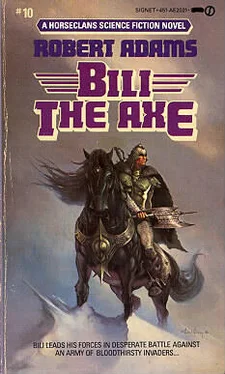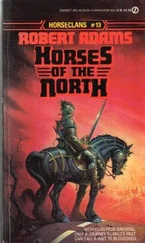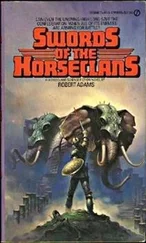Robert Adams - Bili the Axe
Здесь есть возможность читать онлайн «Robert Adams - Bili the Axe» весь текст электронной книги совершенно бесплатно (целиком полную версию без сокращений). В некоторых случаях можно слушать аудио, скачать через торрент в формате fb2 и присутствует краткое содержание. Жанр: Фантастика и фэнтези, на английском языке. Описание произведения, (предисловие) а так же отзывы посетителей доступны на портале библиотеки ЛибКат.
- Название:Bili the Axe
- Автор:
- Жанр:
- Год:неизвестен
- ISBN:нет данных
- Рейтинг книги:3 / 5. Голосов: 1
-
Избранное:Добавить в избранное
- Отзывы:
-
Ваша оценка:
- 60
- 1
- 2
- 3
- 4
- 5
Bili the Axe: краткое содержание, описание и аннотация
Предлагаем к чтению аннотацию, описание, краткое содержание или предисловие (зависит от того, что написал сам автор книги «Bili the Axe»). Если вы не нашли необходимую информацию о книге — напишите в комментариях, мы постараемся отыскать её.
But even as Bili and his warriors rally to the Kuhmbuhluhmers’ aid, the forces of the Witchmen are on the move again. Are Bili and Prince Bryuhn galloping straight into a steel-bladed trap from which death is the only release?
Bili the Axe — читать онлайн бесплатно полную книгу (весь текст) целиком
Ниже представлен текст книги, разбитый по страницам. Система сохранения места последней прочитанной страницы, позволяет с удобством читать онлайн бесплатно книгу «Bili the Axe», без необходимости каждый раз заново искать на чём Вы остановились. Поставьте закладку, и сможете в любой момент перейти на страницу, на которой закончили чтение.
Интервал:
Закладка:
Then came another catastrophe, this one natural but no less awe-inspiring. Tremendous earthquakes rocked and racked and wrecked the entirety of the known regions. In the mountains, volcanos dormant for millions of years spewed forth suddenly, rivers changed their courses overnight, lakes tilted and emptied and became dry land, while other lands subsided to become lakes or swamps or, on the seacoasts, dank salt fens. Then, before any could barely recover from the slackening quakes, a series of mammoth tsunamis smashed onto the length of the Atlantic Seaboard—highest and most destructive in the south, less so toward the north—drowning cities already half ruined, ripping up forests and crops, fouling with salt the rich soil it did not strip away. No one was ever able to accurately enumerate the total loss of human life due to the quakes and tidal waves, but none disputed that it had been tremendous.
When at last the land ceased to tremble and began to dry out, it became clear that the entire shape of this section of the continent was forever changed. The changes had been especially traumatic in and around the Center, for almost all of the peninsula of Florida had sunk to almost or below sea level, leaving the Center itself now surrounded by a single vast swamp.
Few of the Center buildings had suffered damage, luckily, but long months and years of unremitting toil were required to boat in rocks and gravel and soil to raise the area above the encroaching swamp, and even after this herculean task was accomplished, it was readily apparent to all that the complex and its man-made island could only house and support an absolute minimum of personnel and that, consequently, higher ground somewhere to the north or west must quickly be found and settled.
Fortunately, this last was not at all difficult during the chaotic years that immediately succeeded the seismic disturbances, for all order had broken down over vast stretches of the mainland, roads and bridges and even mountain passes had been obliterated, armies and fleets destroyed, and large cities were become mere rubble where traces of them existed at all above the lapping, muddy waters of the sunken coasts.
On a sizable island in the shallow inland gulf now covering portions of southwestern Alabama and southeastern Mississippi with its brackish waters, the first of what was to eventually be a series of “advance bases” was set up. But Base One proved tenable for only about fifty years, then steadily rising waters forced movement onto the true mainland.
Base Two was established near the overgrown ruins of the area known centuries before as Birmingham, and that one lasted for over a century and a half. Then a mysterious and almost always deadly epidemic took off eight or nine out of every ten inhabitants, and the few survivors owed their lives to the last-minute discovery of a vaccine by the feverishly working Center medical laboratories.
At that juncture, Dr. Sternheimer ordered the inland base completely stripped and abandoned, withdrawing all surviving folk to the main Center complex or to another base on the much-shrunken and almost uninhabited island of Cuba, to the south.
Not for two centuries did they try to establish another base to the north, and when at last they did, it was in a very different way. Choosing a particular small tribe of the distant descendants of Americans in an isolated area of the Southern Mountains, they sent in a cadre to teach these illiterate near savages, who were scratching a bare subsistence out of the rocky soil while fighting off attacks by wild beasts and stronger neighbors. Within a couple of generations, thanks to more and better foods, carefully monitored and controlled reproduction, improved housing, sanitation and medical care, and the subsequent decline in deaths and impairment due to disease, the stunted, brutish primitives became a tribe of tall, strong, well-proportioned men and women, most of them clearly possessed of a high degree of native intelligence.
It had been then that Dr. Sternheimer had had schools begun to teach young and old alike elementary subjects, advancing those who seemed to own the potential into more involved education. When he felt the time to be ripe, the Director brought in Major Jay Corbett—one of the original, many-times-transferred minds—from his previous assignment and set him to molding the men and boys of Broomtown into a body of well-trained, disciplined soldiers. For Sternheimer knew that sooner or later he would likely have real need of a corps of dependable troops, units capable of moving fast and striking hard. For the Center and its plans were now faced by several minor threats and a single major one.
The seismic disturbances of centuries past had not only shaken and reformed lands and lakes and seas, but they had shaken apart and destroyed states and governments and all existing order.
Of what had been before, only Kehnooryos Mahkedohnya— the northernmost Greek-speaking state was still more or less the same, with few of its high, rocky coasts submerged and its people still ruled by an aristocracy.
The neighboring Black Kingdoms had mostly ceased to exist; almost all had been swallowed up by the present Caliphate of Zahrtohgah, which occupied almost all of New York State not now underwater. The handful of smaller, weaker Black Kingdoms that were still extant were so only by the sufferance of the Caliphate.
The vast Middle Kingdom, with large areas of its eastern lands now submerged or, at best, become salt fens, now consisted of three large states and scores of smaller ones, constantly shifting alliances and consequently constantly warring.
The even vaster kingdom of the southern Greek-speakers had likewise sundered, though not so thoroughly as had the Middle Kingdom. Despite multitudinous rebellions, invasions by the indigenous mountaineers and war bands from the southerly portions of the Middle Kingdom, and the simultaneous outbreak of a hot, deadly and involved dynastic squabble, the ruling house of the Southern Greek-speakers had managed to hold on to something over a sixth of their former lands, all just south of the Middle Kingdom lands.
Of the rest of the former kingdom, the northeastern portion had become the Kingdom of Karaleenos, while the southeast and southwest had called themselves by the name of the formerly united state, the Kingdom of Kehnooryos Ehlahs, briefly. Then they decided upon the Kingdom of the South, though they were not truly a kingdom under any name, merely a loose confederation of powerful noblemen— thoheeksee , or dukes—who customarily chose one of themselves to be king for life, or until he displeased enough of them to be violently deposed and replaced. David Stemheimer had slowly, over the years, decades and centuries, worked his agents— each always in a body of whatever race and class was appropriate—into sensitive positions and had been gradually jockeying the internal and external relations of the various states toward a position or alignment that might eventually be favorable to a takeover by the Center of the entire Eastern Seaboard, either covertly or overtly.
Then his painstakingly constructed house of cards had been dramatically tumbled. The wild card that effected this destruction was a human mutant, Milo Morai, who had led a horde of horse nomads on a two-decade trek from the high plains of the west to the east coast, where they quickly conquered both of the south-central Greek-speaking states— Kehnooryos Ehlahs and Karaleenos. Fifty-odd years later, this Morai and his forces had halted—if not actually defeated—a huge army of Southern Greeks led, supposedly, by their king, Zastros, but actually led by Dr. Lillian Landor, from the Center.
Dr. Landor had been killed, but not by Morai; however, he had slain several of Sternheimer’s agents—colleagues and friends—torturing most of them to death or near death. On the single occasion when the two had spoken—on a transceiver captured from Dr. Landor—Morai had flatly refused to cooperate in any way with the Center or its patriotic aims and had served notice that he would kill any Center personnel who entered lands ruled by him and his fellow mutants.
Читать дальшеИнтервал:
Закладка:
Похожие книги на «Bili the Axe»
Представляем Вашему вниманию похожие книги на «Bili the Axe» списком для выбора. Мы отобрали схожую по названию и смыслу литературу в надежде предоставить читателям больше вариантов отыскать новые, интересные, ещё непрочитанные произведения.
Обсуждение, отзывы о книге «Bili the Axe» и просто собственные мнения читателей. Оставьте ваши комментарии, напишите, что Вы думаете о произведении, его смысле или главных героях. Укажите что конкретно понравилось, а что нет, и почему Вы так считаете.












